Blida Surname Ancestry ResultsOur indexes 1000-1999 include entries for the spelling 'blida'. In the period you have requested, we have the following 17 records (displaying 1 to 10): Buy all | | | Get all 17 records to view, to save and print for £68.00 |
These sample scans are from the original record. You will get scans of the full pages or articles where the surname you searched for has been found. Your web browser may prevent the sample windows from opening; in this case please change your browser settings to allow pop-up windows from this site. Grantees of royal lands and pardons
(1176-1177)
The Great Rolls of the Pipe are the central record of the crown compiling returns of income and expenditure from the sheriffs and farmers of the various English counties or shires. This is the oldest series of public records, and the earliest surviving instances of many surnames are found in the Pipe Rolls. This is the roll for the 23rd year of the reign of king Henry II, that is, accounting for the year from Michaelmas 1176 to Michaelmas 1177. Most (but not all) of the entries in which names appear relate to payments for grants of land and fines or pardons. The large number of payments of fines for forest transgressions has been interpreted as a form of compounding for pardons by those who had rebelled during the recent years of unrest. There is a separate return in each year for each shire, the name of the shire being here printed at the top of each page. Wales was still independent, in separate kingdoms, at this period, and is not included, except for 'Herefordshire in Wales'. BLIDA. Cost: £4.00.  | Sample scan, click to enlarge
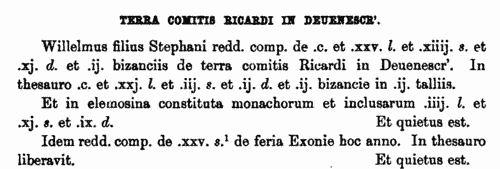
| Clerks and Clergy in Yorkshire, Nottinghamshire, and parts of Lancashire, Westmorland, and Northumberland
(1215-1255)
The register of archbishop Walter Gray of York, containing general diocesan business, mostly relating to clergy. The diocese of York at this period covered all of Yorkshire and Nottinghamshire, as well as Lancashire north of the Ribble, southern Westmorland, and Hexhamshire in Northumberland. The register survives as two rolls (called the Major and the Minor), in all amounting to nearly 71 feet of parchment. It is thought that a third roll or more has been lost, because the acts of the archbishop for the last ten years of his episcopate are missing, as are all the ordination and ecclesiastical discipline records for his reign. The then unpublished parts of the register were edited for the Surtees Society by James Raine and printed in 1870, with some additional material included in appendices.BLIDA. Cost: £4.00.  | Sample scan, click to enlarge

| Fine Rolls
(1246-1272)
The fine rolls of the 31st to 57th years of the reign of king Henry III record part of the government administration in England. These excerpts from the rolls list in transcript applications by plaintiffs for various writs (such as 'ad terminum' and 'pone') and for assizes to be held by the justices in eyre to look into their grievances. A fine of half a mark (6s 8d) or a mark (13s 4d) was usually levied; the cases are normally identified by county, and record that the appropriate sheriff had been notified. There are also more extensive records, in which more detail is given. The excerpts were made by the Record Commission and printed in 1836.BLIDA. Cost: £4.00.  | Sample scan, click to enlarge

| Northumberland Assize Rolls for the General Eyre
(1256-1279)
The royal justices made periodic general eyres through all the shires of England, hearing civil and criminal cases that had accrued from the lower courts. Here we have the assize rolls of three Northumberland eyres, 24 April to 7 May 1256; 25 June to 15 July 1269; and 20 January to 9 February 1279. The bulk of the text relates to civil pleas from the county of Northumberland and the town of Newcastle upon Tyne; finishing with abstracts of the pedes finium, or feet of fines (lawsuits or pretended lawsuits establishing the ownership of land) arising at the three eyres. But there are also criminal cases (as in the scan here), lists of bailiffs, &c.BLIDA. Cost: £4.00.  | Sample scan, click to enlarge

| Yorkshire Inquisitions
(1294-1303)
Inquisitions post mortem are inquiries as to the real estate and heir of each person holding in capite or in chief, i. e. directly, from the Crown, or whose estates had been escheated or were in ward. The age and relationship of the heir are usually recorded. Inquisitions ad quod damnum enquired as to any activities (including maladministration by local officials) that had resulted in any material loss to the Crown. Proofs of age are inquiries into the precise date of birth of an heir, usually involving local inhabitants recalling those circumstances which fixed that date in their mind. Yorkshire inquisitions for this period were edited by William Brown for the Yorkshire Archaeological Society, and printed in 1902. This index covers all names mentioned, including jurors, tenants, &c. The volume also includes two stray inquests, from 1245 and 1282.BLIDA. Cost: £4.00.  | Sample scan, click to enlarge
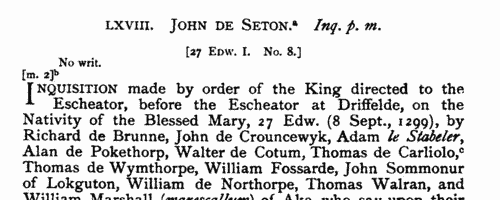
| Inhabitants of Cheshire and North Wales
(1300-1309)
The county of Cheshire had palatine status, being in some measure independent of the rest of England: moreover, from the Statute of Wales of 1284, after king Edward's subjugation of North Wales, until the union of England and Wales in 1536 to 1543, much of the administration of North Wales (county Flint in particular) was directed from Chester. When the Chester Recognizance Rolls were moved from Chester to the Public Record Office, they were placed among the Welsh Records. These rolls, so called because they do include recognizances (of debts &c.) among their contents, are in fact the Chancery Rolls of the palatinate, containing enrolments of charters, letters patent, commissions and other documents issued under the seal of the palatinate. Deeds and other evidences of a private nature were also enrolled on them. A calendar of the Recognizance Rolls from their commencement to the end of the reign of Henry IV was prepared by Peter Turner and included in the 36th Annual Report of the Deputy Keeper of the Public Records in 1875. We have now indexed this, dividing the enrolments into decades. This is the period from the 29th year of the reign of king Edward I to the 3rd year of king Edward II.BLIDA. Cost: £6.00.  | Sample scan, click to enlarge
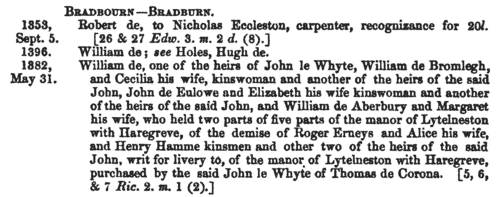
| Inhabitants of London
(1275-1312)
Letter Book B of the City of London contains enrolments of recognizances between inhabitants, particularly citizens, for sums of money lent or due; grants of pieces of land or property; and various records relating to the city administration.
BLIDA. Cost: £4.00.  | Sample scan, click to enlarge
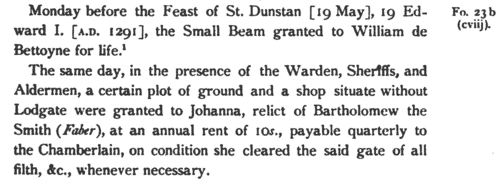
| Close Rolls
(1313-1318)
The close rolls of the 7th, 8th, 9th, 10th and 11th years of the reign of king Edward II record the main artery of government administration in England, the orders sent out day by day to individual officers, especially sheriffs of shires: they are an exceptionally rich source for so early a period. In amongst this official material, the rolls were also used as a way of recording many acknowledgments of private debts and contracts between individuals. Most of the contents relate to England, but there are also entries concerning Wales, Scotland, Ireland and the English possessions in France.BLIDA. Cost: £4.00.  | Sample scan, click to enlarge

| Inhabitants of Cheshire and North Wales
(1310-1319)
The county of Cheshire had palatine status, being in some measure independent of the rest of England: moreover, from the Statute of Wales of 1284, after king Edward's subjugation of North Wales, until the union of England and Wales in 1536 to 1543, much of the administration of North Wales (county Flint in particular) was directed from Chester. When the Chester Recognizance Rolls were moved from Chester to the Public Record Office, they were placed among the Welsh Records. These rolls, so called because they do include recognizances (of debts &c.) among their contents, are in fact the Chancery Rolls of the palatinate, containing enrolments of charters, letters patent, commissions and other documents issued under the seal of the palatinate. Deeds and other evidences of a private nature were also enrolled on them. A calendar of the Recognizance Rolls from their commencement to the end of the reign of Henry IV was prepared by Peter Turner and included in the 36th Annual Report of the Deputy Keeper of the Public Records in 1875. We have now indexed this, dividing the enrolments into decades. This is the period from the 3rd to the 13th years of the reign of king Edward II.BLIDA. Cost: £6.00.  | Sample scan, click to enlarge
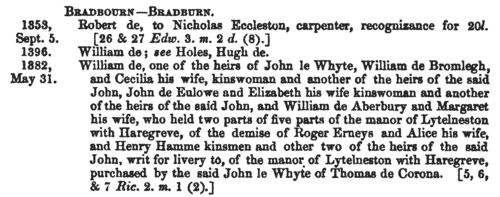
| Grantees of offices, commissions and pardons
(1317-1321)
The Patent Rolls are the Chancery enrolments of royal letters patent. Those for the 11th to the 14th years of the reign of king Edward II (8 July 1317 to 7 July 1321) were edited for the Public Record Office by G. F. Handcock, and published in 1903. The main contents are royal commissions and grants; ratifications of ecclesiastical estates; writs of aid to royal servants and purveyors; and pardons. Most extensive are the commissions of oyer and terminer to justices to investigate complaints about specific crimes and wrongs in particular counties.BLIDA. Cost: £2.00.  | Sample scan, click to enlarge

|
| 1 | 2 |  |
Research your ancestry, family history, genealogy and one-name study by direct access to original records and archives indexed by surname.
|












